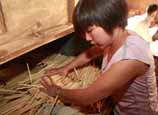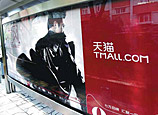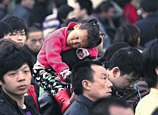
WUHAN, March 21 (Xinhua) -- Over 20,000 college students have taken high-interest loans to buy fancy electronic products, mostly Apple devices, in central China's Wuhan City.
From the start of Jan. 2012 to the end of Feb. 2013, the students have applied for loans with a total value of 160 million yuan (about 25.76 million U.S. dollars) from Home Credit China (HC China), a subsidiary of international investment business PPF Group.
"We have lost touch with about 100 of them, getting no response to calls or letters reminding them about delayed payments," said Liu Mingwei, Wuhan regional manager with HC China, on Wednesday.
With around 1 million students in Wuhan, it means about one in 50 of them are shouldering HC China's heavy annual interest rates of up to 47.12 percent on a 12-month-term loan.
About 90 percent of the credit was used to buy Apple products, such as iPhones and iPads, and other high-end electronic products, said Li.
Home Credit China provides credit loans in nine, 12 and 15-month terms for college and university students, providing they can present an ID card, bank card and student ID card. Loan amounts range from 540 to 10,000 yuan.
"Quite different from the loan approval process in a bank, HC China passes the credit loan application in as little as dozens of minutes," according to Zhang Zheng, a HC China salesman in Wuhan.
Then, students can take away goods after paying a down payment in HC China's partner stores. The down payments range from 10 to 30 percent of the marked price for each item.
In Wuhan, HC China's list of partner stores cover major electronic products centers and chain stores such as Gome and Sunning. And the easy loans stimulate their sales volume.
In spite of this, some stores have refused such cooperation. "I counted the loan rate and refused such unscrupulous usury," said a store boss who did not wish to be named.
The loans have encouraged young students to embrace the craze for Apple devices.
"Apple products are a common topic or a particular community in campus. I used to feel isolated while they were discussing and playing with iPhones or iPads," said a student of Wuhan University of Science and Technology surnamed Yu.
About half of her classmates and roommates have an iPhone. "I felt embarrassed even to take a look when they were in a heated discussion about a new application," Yu said.
She bought an iPhone with credit loan "in the heat of the moment during a marketing campaign by a salesman of HC China, but felt regret afterward." The girl finally paid the credit with the help of her parents.
Similar to Yu, Wang Yong, studying at the China University of Geosciences, failed to pay back the loan in March due to overspending at the beginning of the spring semester. At that point, he started to work part-time in KFC.
"The HC China salesman continuously called to warn me about the possible poor credit record, which would have a bad effect in the future. I was so afraid," Wang said, explaining that he had to ask his parents for help.
HC China will report the bad credit of the "vanished" college students who have failed to pay back their loan, according to the firm's Wuhan branch.
Though college students are adults, their consumption view is not yet mature, said Qiu Baochang, leader of the lawyer team with the China Consumer Association.
Consumer finance companies like HC China offer loans to them with quite loose examinations, which is an incentive to the young people's irrational consumption, said Qiu.
The lawyer called for a rational consumption guide to educate college students, and suggested the government strengthen supervision on consumer finance companies in lending.
In 2009, the People's Bank of China issued a regulation stopping banks from issuing lines of credit above 1,000 yuan to students.


















![]()
